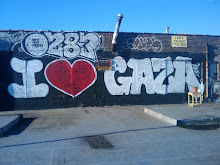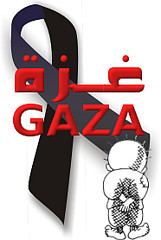Sunday, August 9, 2009
Thursday, August 6, 2009
Kites, Gaza, and the American Ghetto

White phosphorous rockets rain down on Gaza

Gaza youth fly kites on Beit Lahiya beach
Somehow when I first saw the Kite photo, the White Phosphorous photo leapt into my mind. The skies of Gaza went from having lethal plumes of smoke rain down through them, to homemade kites sail up through them. Such is life, with juxtaposing experiences and realities. After being flooded with images of bombs, rockets raining down on Gaza I smiled to see kites sailing, free, up, through the sky. But then I remembered Gaza in 2006-- the image from the beach then imprinted in my mind is of Huda Ghaliya hysterical after an Israeli bomb killed some 7 members of her family who had gone to the beach for the day to escape Israel's bombing campaign.
But this is Gaza-- and I suppose it is similar to other places on earth shackled by war, occupation, colonization, violence, and oppression in its many forms. Every bit of the land holds feelings of love and beauty, history and hope-- but also deep loss, violence, and fear. All these feelings and experiences are interconnected, although some disproportionately realized. As George Santayana observes, "the world is not respectable; it is mortal, tormented, confused, deluded forever; but it is shot through with beauty, with love, with glints of courage and laughter; and in these, the spirit blooms."
Alice Walker recently joined the Code Pink brigade on their mission to Gaza, and wrote poignantly and personally of her experience there. Walker grew up in Georgia during legal segregation in the States and wrote that she felt a "homecoming" upon entering Gaza. The experiences of Black Americans living in segregated Georgia's ghetto find commonality with those of Palestinians imprisoned in Gaza: life defined primarily (solely?) by nationality/race by an outside population; disenfranchisement; fear; movement and freedom limited by tangible physical boundaries; every positive action is one which breathes resistance and struggle. She discusses the pointed effort made by the Civil Rights movement to overcome hatred and work towards a common human spirit. It is this common spirit that somehow eludes our world leaders which we must continue to work towards realizing. Because it is there-- for those who are able, somehow-- surely through personal struggle, self-awareness, and a a deep sense of responsibility-- to rise above the "boxes" we put ourselves in which increase the divisions between us as people, above our own personal loss, the idea of "us" and "them"...the commonalities are evident, and they, hopefully, can lead us in learning to overcome these divisions of hatred which enable the most atrocious forms of violence.
Alice Walker did her part in visiting Gaza and, upon returning to the States and fulfilling a promise she made to a Palestinian woman she'd met during her trip, invited Oprah Winfrey to do the same. Let's see if Oprah's got it in her.
Saturday, August 1, 2009
Gaza Today: August 6, 2009
"The best place one could be on Earth"
(Alice Walker, author of The Color Purple, EI)
(Alice Walker, author of The Color Purple, EI)
(Mel Frykberg, EI)
(Guardian, photos)
(Ian Black, Guardian)
Labels:
activism,
human rights,
mental health,
photos
Subscribe to:
Posts (Atom)


